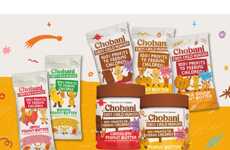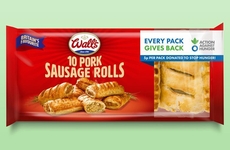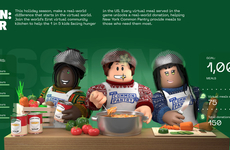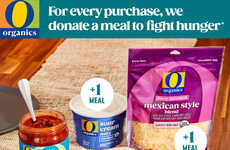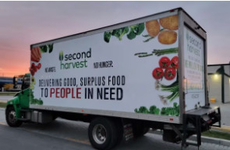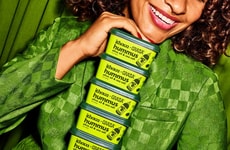
Food packets, or what is called ready-to-use food (RUF) may be the secret to helping end world hunger. Doctors Without Borders believe that by increasing shipments of RUF, millions of children could be saved from starvation.
The extremely high rates of world hunger are shocking, and disturbing to those people who have never experienced it, mostly because we feel there is nothing we can do. Many people contribute to charities, donate to food drives, or support foreign aid workers, but no significant breakthroughs have been made yet.
The key concern is that while the children may receive food, the items they're consuming still don't supply adequate nutrition that will help them gain weight, regain strength and fend off illness.
That's why RUF could be the answer. It's "a blend of such ingredients as milk powder, peanut butter, vegetable oil, sugar, vitamins and minerals in individual packets designed to provide all the nutrients a young child needs," CBC reported.
The packages have a long shelf-life and aren't affected by weather conditions like extreme heat. They're ready to use and don't require preparation. A child doesn't have to rely on an adult to benefit from the packages, they don't need to go into any areas of potential danger to gather firewood or water.
"The doctors group, which won the 1999 Nobel Peace Prize, is launching a campaign under the slogan Food is Not Enough, asking donors, researchers, governments and international organizations to help provide the cash and know-how required to get RUF to those who need it."
They believe that they could save five million children under the age of five. That's truly incredible. The only obstacle is the price, and getting approval from the U.S. government. While not outrageously expensive, the RUF still costs more than the other goods, like corn and wheat, that are currently being sent. In addition, "they face obstacles in Washington from policies intended to ensure that U.S. aid dollars buys U.S. farm products."
What's key to remember is that it's the quality of food, not quantity, that can ensure these children get healthy, and that's the message Doctors Without Borders are trying to get across. If RUF gets approval and funds start going toward that production, the future could hold a lot of hope.
It seems, however, that for now, these doctors do have borders after all.
The extremely high rates of world hunger are shocking, and disturbing to those people who have never experienced it, mostly because we feel there is nothing we can do. Many people contribute to charities, donate to food drives, or support foreign aid workers, but no significant breakthroughs have been made yet.
The key concern is that while the children may receive food, the items they're consuming still don't supply adequate nutrition that will help them gain weight, regain strength and fend off illness.
That's why RUF could be the answer. It's "a blend of such ingredients as milk powder, peanut butter, vegetable oil, sugar, vitamins and minerals in individual packets designed to provide all the nutrients a young child needs," CBC reported.
The packages have a long shelf-life and aren't affected by weather conditions like extreme heat. They're ready to use and don't require preparation. A child doesn't have to rely on an adult to benefit from the packages, they don't need to go into any areas of potential danger to gather firewood or water.
"The doctors group, which won the 1999 Nobel Peace Prize, is launching a campaign under the slogan Food is Not Enough, asking donors, researchers, governments and international organizations to help provide the cash and know-how required to get RUF to those who need it."
They believe that they could save five million children under the age of five. That's truly incredible. The only obstacle is the price, and getting approval from the U.S. government. While not outrageously expensive, the RUF still costs more than the other goods, like corn and wheat, that are currently being sent. In addition, "they face obstacles in Washington from policies intended to ensure that U.S. aid dollars buys U.S. farm products."
What's key to remember is that it's the quality of food, not quantity, that can ensure these children get healthy, and that's the message Doctors Without Borders are trying to get across. If RUF gets approval and funds start going toward that production, the future could hold a lot of hope.
It seems, however, that for now, these doctors do have borders after all.
Trend Themes
1. Increasing Shipment of RUF - Opportunity for companies in the food distribution industry to explore partnerships with organizations like Doctors Without Borders to increase the shipment of RUF packets and address world hunger.
2. Ready-to-use Food (RUF) - Innovative companies in the food manufacturing industry can focus on developing and producing RUF packets that provide all the necessary nutrients for young children in need, creating a disruptive solution for addressing malnutrition.
3. Quality Over Quantity - There is a growing emphasis on the importance of providing high-quality, nutrient-dense food to combat malnutrition, creating opportunities for companies in the food industry to develop and market innovative products with enhanced nutritional value.
Industry Implications
1. Food Distribution - Food distribution companies have the opportunity to collaborate with organizations like Doctors Without Borders to facilitate the increased shipment of RUF packets to areas affected by hunger, helping address nutritional deficiencies in children.
2. Food Manufacturing - Innovative food manufacturing companies can invest in research and development to create ready-to-use food (RUF) packets that provide optimal nutrition for children, contributing to the fight against malnutrition and hunger.
3. Food Industry - The food industry can explore opportunities to develop and promote nutritious food products that prioritize quality over quantity, meeting the demands of consumers who seek healthier options while addressing global hunger issues.
6.5
Score
Popularity
Activity
Freshness


